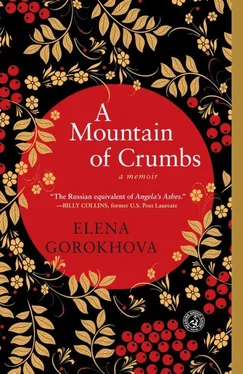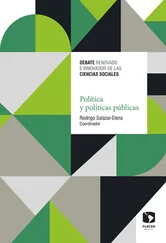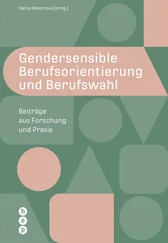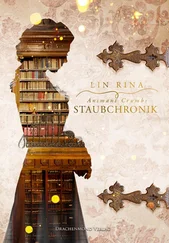I stop in front of the October billboard, which pictures the same singer whom I heard here fifteen years earlier. I imagined then how terrible it must have felt for him to stand there, in front of everyone in the twenty-four orchestra rows, four tiers, and the former tsarist box in the center, having in one second ruined the defining moment of Lenin’s life and the cause of the Revolution itself.
I gaze at the poster: the same disgraced singer, the same dishonored country.
MY SUITCASE GAPES OPEN on the couch, with a new pair of sandals between two shirts Marina crocheted for me. The shirts, green and purple, the only colors of thread she could find in the stores, are designed in elaborate patterns of leaves and flowers. Marina spent days bent over at a window, a tiny metal hook dipping between her fingers. I’ve seen her resew clothes—convert a pair of old pants into a patch-pattern skirt or rip out the lining of a jacket from the mothball darkness of the storage space above the refrigerator and turn it into a silk blouse—but I never suspected that such intricate elegance could emerge from under her hands.
“They’re beautiful,” I say. “It’s unfair that one person can have so many talents.”
I open the armoire and stare at the clothes dangling from hangers, none worth lugging across the Atlantic. A flowery polyester dress my mother bought for me that I have never worn; a shapeless cardigan with elbows stretched out; a sweater punctured with sparkling thread, lint clinging to its sleeves.
“Don’t forget the warm things,” says my mother, lumbering in with a load of wet laundry she begins to pin on two clotheslines crisscrossing the room.
Warm things, according to her, are as essential as soup for proper nutrition or fresh air for healthy lungs. One should always have a good amount of warm things—hats, gloves, scarves, and coats—to ensure survival.
“I won’t need any warm things,” I say. “I’m going to Texas. It’s warm there all year long.”
“It’s warm now,” she says, pinning up a sheet, “but come winter and you’ll be sorry you don’t have them.” She bends over the pile of laundry and quotes one of her proverbs, “We don’t cherish what we have, then cry when we lose it.”
I’m about to say that Texas has no winter, but I don’t. In the past few weeks my mother’s sayings have strangely begun to make sense; it has occurred to me that maybe all those little lines we’ve heard since nursery school sound like such clichés precisely because they are true. “Without work, you won’t even pull a minnow out of a lake,” or “Don’t get into someone else’s sled,” or “If you knew where you’d fall, you’d put down some straw”—they all, I’m reluctant to admit, are beginning to feel like unlearned lessons of wisdom, too late to start acquiring now.
When my mother is finished pinning up our duvets and pillowcases, she goes into the kitchen to make dinner. Marina is home tonight, too, and as I stand in the hallway under the coatrack among the crinkly raincoat sleeves, I hear the muted sizzling of their voices. My mother’s voice trembles with fear; my sister’s sputters with contempt for anyone who feels alarmed about leaving for the West.
“What do we know about America, really?” says my mother. “People beg on the streets and sleep under bridges and everyone walks around with a gun.”
“Good,” says Marina. “If I had a gun here I’d know what to do with it.”
There is a pause, a clinking of pots. I want to go in and tell my mother that I won’t beg or sleep under a bridge.
“And how is this nearsighted writer going to support her?” asks my mother. “He is a student, isn’t he? Do they have stipends for students over there?”
“How do I know?” barks Marina in a stage whisper. “She doesn’t need any stipends from him. She speaks English. She’ll do just fine.”
I hear my mother sigh, then sniffle.
I pop my head into the kitchen door. “Did you hear that?” I say. “I’ll do just fine. I promise.” I straighten up and bend my elbow in a Pioneer salute. My mother shakes her head and blows her nose, but I can see a little smile struggling to rise to her lips.
I go back to the room divided by the wet laundry, to my half-empty suitcase. I pack the American Heritage Dictionary in its red jacket, a present from Robert, the second most valuable thing I own after a pair of corduroy Levis. From the dresser I scoop several bottles of perfume I bought with my private-student income. I carefully wrap each one in newspaper and place them between the shirts.
The rest of the twenty kilograms Aeroflot allows is presents. Russian souvenirs for Robert and his family that my mother and sister have been piling on the couch. Wooden spoons painted in the red and gold colors of Khokhloma, black metal trays with roses, linen tablecloths with matching napkins. On the television set beams a chrome samovar my mother obtained through her medical connections, a present I’ve refused to take. I could see myself in an American airport, swaddled in kerchiefs and scarves, cardboard samovar boxes tied with string weighing down my hands.
When I’m finished packing, Marina comes into the room. She straightens the sheets on the clothesline, closes my suitcase, and pulls it down onto the floor. We sit wedged into the corner of the couch, without talking, in a space darkened by the hanging laundry.
“What do you think America’s really like?” I ask.
She stares at my suitcase, thinking. “It’s like a corridor of light,” she says. “You know, what people are supposed to see before they die—this shining light, a passage to somewhere else.”
I don’t know why I’m asking Marina, who clings to superstitions and believes in everything our dacha Gypsy neighbor tells her when she fans a deck of cards. I don’t know why I’m listening to my sister, who went to St. Nicholas Cathedral two blocks from our house in Leningrad and paid five rubles to get baptized by a drunk charlatan with dirty hair. I’m also not grateful to her for this dubious analogy. I’m not planning to die tomorrow. On the contrary, my life is just about to begin, as far as I can see.
She looks into my face and moves closer. “It’s our bright future, this light,” she says. “The future we’ve been promised since nursery school, since 1917 and the storming of the Winter Palace. Only no one has told us it’s on the other side of the Atlantic Ocean.”
We sit quietly for a minute, without moving.
“You have to tell Mama,” I say. “About the bright future.”
She nods and puts her arm around my shoulder.
“It’s scary, like the first day of school,” I say. “First grade, when I was seven. Everyone came wearing white aprons over their uniforms, but I didn’t know—and Mama didn’t tell me; maybe she didn’t know either—so I wore the regular black. I stood there, the only one in black among the crowd of white, not even knowing what my teacher looked like, not even knowing where I was supposed to go. With a stupid bunch of gladioli Mama stuffed into my hand.”
“From our dacha, no doubt,” says Marina and wiggles even closer.
“Yeah,” I say. “Where else?”
GRIS, WHO HAS VOLUNTEERED to drive me to the airport, arrives at two-thirty, ten minutes early. When Marina opens the door, all we can see is a huge bunch of flowers Gris is holding in front of his face.
“Here, here.” My mother hurries out of the kitchen with a vase. “Peonies are very fragile; they can’t survive long without water.” She sets the flowers on the table in the room with my desk and Marina’s couch. It is Marina’s room now.
I check my handbag: my passport, which still smells of the printing press; an Aeroflot ticket, a glossy rectangular booklet with red carbon-paper pages; one hundred and thirty dollars, the allowed amount of currency for departees, exchanged yesterday in the vaulting emptiness of the central bank.
Читать дальше












